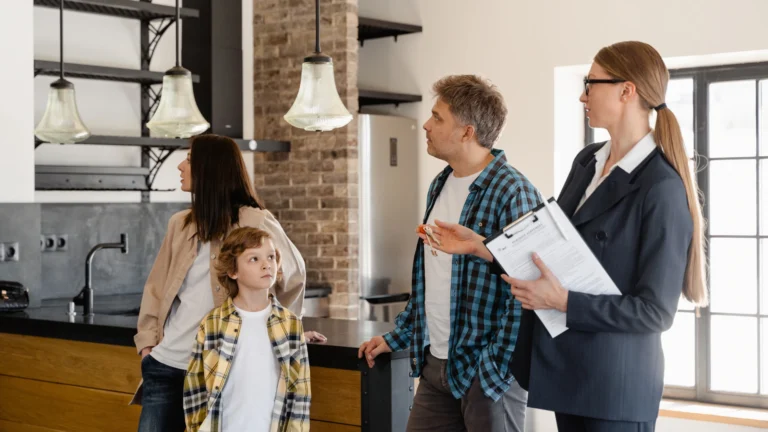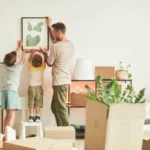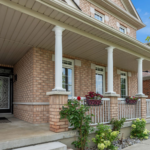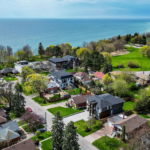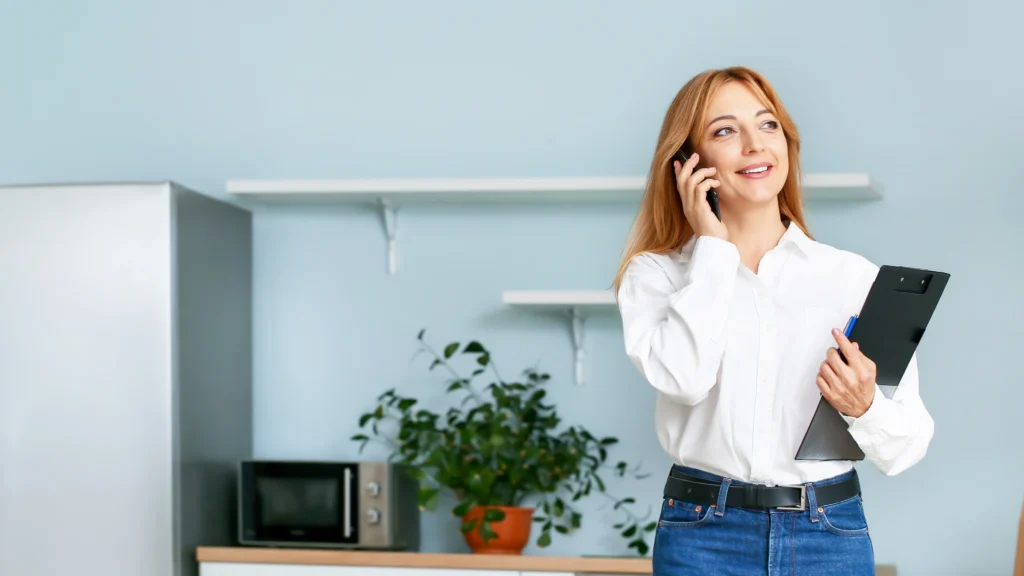Open houses are a classic part of the real estate experience, offering a unique opportunity for buyers to step inside potential homes and for sellers to showcase their property to a wide audience. If you’re here, you might be a first-time buyer nervously attending your first open house, a seasoned investor scouting for deals, or a homeowner preparing to welcome strangers into your space. Either way, this guide is for you! Understanding how to navigate open houses can make all the difference in your real estate journey.
We’ll walk you through everything you need to know about open houses in Canada. Here’s what we’ll cover:
- Open house tips for buyers
- How to prepare for an open house as a seller
- Do open houses sell homes faster?
- Virtual open houses vs. in-person: Pros and cons
- FAQ on Open Houses: etiquette, details & logistics
Open House Tips For Buyers: How to Prepare for and Evaluate the Property
Attending an open house is about more than just admiring the interior design or imagining where you might place your furniture. Savvy buyers know that these events provide a valuable opportunity to assess a property’s true condition, potential, and suitability for their needs. The key is knowing what to look for and how to gather the right information during your visit.
What to Look for at an Open House
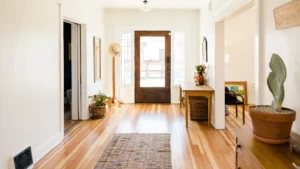
Before you step through the front door…
- Observe the home’s exterior and surrounding neighborhood. Do you like the atmosphere?
- Notice the condition of the roof, siding, and foundation. Are there any visible cracks or signs of water damage?
- Explore the street. How does the property compare to others on the block?
These initial observations can tell you a lot about how well the home has been maintained.
Once inside, resist the temptation to focus solely on superficial elements like paint colors or decor. Instead, pay attention to more telling details.
- Check how doors and windows open and close. Do they stick or operate smoothly?
- Take note of the flow between rooms and whether the layout matches your lifestyle needs. For example, parents of small children prefer rooms to be in the same floor and close by.
- Listen for unusual noises from plumbing or heating systems, and be mindful of any musty odors that might indicate moisture problems.
Bring essential tools to make the most of each open house visit (no, it’s not too much. You want to be thorough for such a big decision).
- A measuring tape will help you determine if your existing furniture will fit in the space (Measuring doors will save you future headaches when you bring in your bed frames or fridge).
- Your smartphone can be used to document details you might want to review later, though always ask permission before taking photos.
- Keep a notebook or your notes app handy to record your impressions and any questions that arise during your visit.
What to ask the Realtor at an Open House
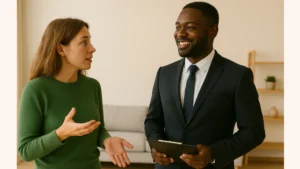
One of the most important open house tips for buyers is to engage with the hosting realtor, as they can provide valuable insights. Here are some suggested questions:
- How long has the property been on the market?
- Have you done any adjustments to the initial price?
- What items or details are included in the sale? (for example, built-in appliances, light fixtures, or cabinets)
- What are the average utility costs?
- Have they done any recent renovations or upgrades? (this could reveal some of the details to keep an eye on)
The more information you gather during the open house, the better positioned you’ll be to make an informed decision later.
Open House Checklist for Buyers

To ensure you don’t miss anything important during your visit, use this simple open house checklist for buyers:
✔ Measuring tape to check furniture fit.
✔ Smartphone for photos (with permission).
✔ Notebook for observations and questions.
✔ Comfortable shoes for multiple viewings.
For Sellers: Preparing Your Home for a Successful Open House
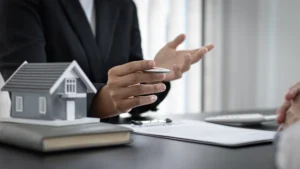
If you’re preparing to host an open house, your goal is to create an environment where potential buyers can easily envision themselves living in your home. This requires careful preparation that goes beyond just cleaning up. Start by decluttering each room to create a sense of spaciousness, and consider removing personal items like family photos. Why? to help buyers imagine the space as their own.
A deep clean is essential. Pay special attention to kitchens and bathrooms, as smart buyers will scrutinize these areas closely. Don’t overlook less obvious details like baseboards, light fixtures, and inside cabinets. Address any lingering odors, whether from pets, cooking, or smoke, as these can be immediate turn-offs for visitors.
Your home’s exterior and entryway create the all-important first impression. Ensure your lawn is neatly mowed, walkways are clear, and the front entrance is inviting. A fresh coat of paint on the front door or some potted flowers can make a big difference in curb appeal. Inside, open all curtains and blinds to maximize natural light, and consider adding lamps in darker corners to create a bright, airy atmosphere.
One of the most important decisions you’ll make is whether to stay during the open house. While it may feel natural to want to be present, most real estate professionals recommend that sellers leave during the event. Buyers tend to feel more comfortable exploring the home and voicing their honest opinions when the owners aren’t present. This also gives your realtor the freedom to do their job effectively, answering questions and highlighting your home’s best features without hesitation.
Is It True? Do Open Houses Sell Homes Faster?
People who are seeking strategies like open houses to sell homes faster always want to know if they are foolproof. The answer isn’t straightforward, as the effectiveness of open houses can vary depending on market conditions, location, and how well the event is executed.
A well-attended open house can create a sense of urgency among buyers, potentially leading to multiple offers. Even visitors who aren’t ready to buy might mention the property to friends or family members who are in the market, expanding your pool of potential buyers.
However, in slower markets or for higher-priced properties, open houses may have less impact on the speed of sale. Many real estate professionals note that serious buyers typically schedule private showings rather than relying on open house visits. Additionally, some open house attendees are simply curious neighbors or casual lookers rather than genuine prospective buyers.
One often-overlooked benefit of open houses is the feedback they generate. Your realtor can gather impressions from visitors about what they liked and didn’t like about the property, giving you valuable insights that might help with pricing or presentation adjustments.
Ultimately, the most honest answer when asking if open houses actually sell homes faster is that it depends on your specific circumstances, and knowledgeable local realtors can advise you on whether an open house makes sense for your property based on current market conditions in your area.
H2 – Virtual vs. In-Person Open Houses: Understanding the Options
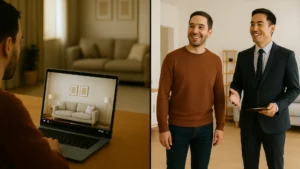
The real estate landscape has evolved significantly in recent years, with virtual open houses becoming an increasingly popular option. While traditional in-person open houses remain common, understanding the differences between these formats can help both buyers and sellers make informed decisions.
In-person open houses offer the irreplaceable experience of physically being in the space. Buyers can get a true sense of the home’s proportions, natural light, and overall feel that’s difficult to capture through a screen. They can notice subtle details like the quality of finishes, the flow between rooms, and even neighborhood sounds that might not be apparent in a virtual tour. For sellers, in-person events provide the opportunity to create an emotional connection through staging, lighting, and even carefully chosen scents.
Virtual open houses, conducted through live video walkthroughs or pre-recorded 3D tours, offer distinct advantages in terms of convenience and accessibility. Out-of-town buyers can explore properties without traveling, and attendees can view homes outside of traditional open house hours. Virtual events also allow for easy revisiting of properties, as buyers can rewatch tours to refresh their memory.
However, virtual tours have limitations. The camera can distort spaces, making rooms appear larger or smaller than they actually are. Important details like flooring transitions or ceiling heights might not be adequately represented. There’s also the challenge of accurately conveying the home’s atmosphere and the surrounding neighborhood’s vibe.
The most effective approach often combines both formats. Many sellers now host in-person open houses supplemented by virtual tours for those who can’t attend physically. Buyers might use virtual open houses to narrow down their options before committing to in-person visits of their top choices.
Frequently Asked Questions About Open Houses
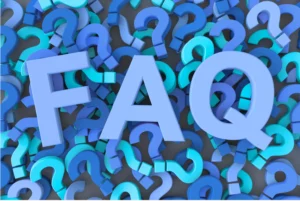
Do open houses lead to higher offers?
While there’s no guarantee, a well-executed open house can sometimes generate competing offers, particularly in desirable neighborhoods or when inventory is low. When multiple interested buyers attend the same open house, it can create a sense of urgency that may translate into stronger offers. However, this effect is most common in seller’s markets with high demand.
How can I find open houses in my area?
Several resources can help you locate upcoming open houses. Realtor.ca is a comprehensive source that lists open houses across Canada. Local real estate agency websites often promote their listings’ open house schedules. Many communities have Facebook groups where agents share information about upcoming open houses. If you’re working with a realtor, they can provide personalized recommendations based on your criteria. Another simple method is driving through neighborhoods you’re interested in on weekends, when most open houses occur, and looking for signage.
Is it acceptable to attend an open house without my own realtor?
Absolutely. Open houses are designed for public viewing, and you’re welcome to attend without representation. However, if you’re seriously considering making an offer, having your own realtor can be advantageous. They can provide objective advice, help you understand market values, and handle negotiations on your behalf. If you do connect with the listing agent at an open house, remember they represent the seller’s interests, not yours.
What’s the best time to attend an open house?
Timing can affect your experience. Early in the scheduled time often means fewer crowds and more opportunity to ask questions. Later visits might let you observe how many people have attended, which can indicate the level of interest in the property. Some buyers prefer to visit toward the end when there are fewer people, allowing for a more thorough inspection.
How should I dress for an open house?
While there’s no strict dress code, a lot of people ask about the etiquette of open houses. It’s always wise to present yourself neatly, especially if you might be speaking with the listing agent about making an offer. Comfortable shoes are recommended as you’ll likely be doing a fair amount of walking and standing.
Can I bring children to an open house?
While children are generally welcome, consider whether it’s the right experience for them. Young children might need close supervision to ensure they don’t touch fragile items or run through the home. If possible, having another adult along to help with childcare might allow you to focus better on evaluating the property.
Making the Most of Your Open House Experience
Whether you’re buying or selling, approaching open houses with the right preparation and mindset can significantly impact your real estate success. For buyers, these events offer a valuable opportunity to compare properties, assess neighborhoods, and gather information that might not be apparent in online listings. By knowing what to look for and asking the right questions, you can turn open house visits into powerful research tools.
Sellers who invest time in properly preparing for their open house increase their chances of making a strong impression on potential buyers. Thoughtful staging, attention to detail, and understanding what motivates buyers in your market can all contribute to a successful event.
Remember that every open house is an opportunity. It might be the chance to find your dream home, to sell your property effectively, or simply to learn more about your local real estate market. With the right approach and these insights in mind, you’ll be well-equipped to make your next open house experience productive and successful.
If you’re currently exploring the Canadian real estate market, whether as a buyer, seller, or investor, we invite you to check out our other resources on topics like first-time home buying, selling strategies, and market trends. Have specific questions about open houses that we didn’t cover? Feel free to reach out to our agents, who are always happy to help you navigate your real estate journey.
